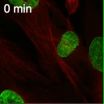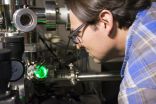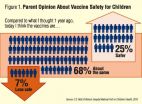Waiting to harvest after a rain enhances food safety
2015-07-06
(Press-News.org) ITHACA, N.Y. - To protect consumers from foodborne illness, produce farmers should wait 24 hours after a rain or irrigating their fields to harvest crops, according to new research published in the journal Applied and Environmental Microbiology.
Rain or irrigation creates soil conditions that are more hospitable to Listeria monocytogenes, which when ingested may cause the human illness Listeriosis. Waiting to harvest crops reduces the risk of exposure to the pathogen, which could land on fresh produce.
Cornell scientists, along with other agricultural researchers from around the country, are conducting more food safety research in order to set rules, standards and guidelines for the Food Safety Modernization Act, which became law in 2011.
"We're looking at the science that helps governmental entities, such as the U.S. Food and Drug Administration, and private entities create policies that keep our food supply safe," said Daniel Weller, a doctoral student in the field of food science and the lead author of the new work, "Spatial and Temporal Factors Associated With an Increased Prevalence of Listeria monocytogenes in New York State Spinach Fields." The other authors are Martin Wiedmann, Cornell's Gellert Family Professor in Food Safety, and Laura Strawn, assistant professor at Virginia Tech.
Factors such as proximity of a field location to water and other landscape features also play important roles in the presence of Listeria. The researchers tested fields in a variety of locations throughout New York and found that after rains or irrigation, the chances of finding Listeria were 25 times greater. But, after the fields dried at least 24 hours, the chances of detecting Listeria dropped dramatically, to levels similar to baseline.
Currently, the U.S. Food and Drug Administration has proposed rules allowing farmers to apply "wait periods" after application of irrigation water. This would allow for "potentially dangerous microbes to die off," said the FDA.
Through a combination of weather data, GIS technology and data driven information, technology allows farmers and producers to take a systems approach managing food safety.
Said Wiedmann: "Current technology tools are improving food safety and increasing consumer confidence in food products."
INFORMATION:
The Center for Produce Safety funded this research.
Cornell University has television, ISDN and dedicated Skype/Google+ Hangout studios available for media interviews.
ELSE PRESS RELEASES FROM THIS DATE:
2015-07-06
Astronomers have found evidence for a large population of hidden supermassive black holes in the Universe.
Using NASA's Nuclear Spectroscopic Telescope Array (NuSTAR) satellite observatory, the team of international scientists detected the high-energy x-rays from five supermassive black holes previously clouded from direct view by dust and gas.
The research, led by astronomers at Durham University, UK, supports the theory that potentially millions more supermassive black holes exist in the Universe, but are hidden from view.
The findings are being presented at the ...
2015-07-06
For cell division to be successful, pairs of chromosomes have to line up just right before being swept into their new cells, like the opening of a theater curtain. They accomplish this feat in part thanks to structures called centrioles that provide an anchor for the curtain's ropes. Researchers at Johns Hopkins recently learned that most cells will not divide without centrioles, and they found out why: A protein called p53, already known to prevent cell division for other reasons, also monitors centriole numbers to prevent potentially disastrous cell divisions.
Details ...
2015-07-06
Richland, Wash. -- Despite decades of industrial use, the exact chemical transformations occurring within zeolites, a common material used in the conversion of oil to gasoline, remain poorly understood. Now scientists have found a way to locate--with atomic precision--spots within the material where chemical reactions take place, and how these spots shut down.
Called active sites, the spots help rip apart and rearrange molecules as they pass through nanometer-sized channels, like an assembly line in a factory. A process called steaming causes these active sites to cluster, ...
2015-07-06
Anti-inflammatory drug is one thousandth of the cost of the current drug which works in the same way
Discovery may open up cost effective treatment options not just for the NHS but also cancer patients across the world
Scientists at the University of Sheffield have discovered that a common drug given to arthritis sufferers could also help to treat patients with blood cancers.
Myeloproliferative neoplasms (MPN) are diagnosed in around 3,300 UK patients every year and cause an overproduction of blood cells creating a significant impact on quality-of-life, with symptoms ...
2015-07-06
ANN ARBOR, Mich. -- Over the same time period that multiple outbreaks of measles and whooping cough made headlines around the country, parents' views on vaccines became more favorable, according to a new nationally-representative poll.
The University of Michigan C.S. Mott Children's Hospital National Poll on Children's Health asked parents in May how their views on vaccinations changed between 2014 and 2015 - during which two dozen measles outbreaks were reported in the U.S., including a multi-state outbreak traced to Disneyland.
One-third of parents who participated ...
2015-07-06
A spider's web is one of the most intricate constructions in nature, but its precious silk has more than one use. Silk threads can be used as draglines, guidelines, anchors, pheromonal trails, nest lining, or even food. And each use requires a slightly different type of silk, optimized for its function.
"Each type of silk has similar proteins, but they are synthesized differently," said Sinan Keten, assistant professor of mechanical and civil engineering at Northwestern University's McCormick School of Engineering. "Then the spider knows how fast to reel the silk to get ...
2015-07-06
An ambitious policy package is essential for the UK to transform its energy system to achieve the deep reductions in carbon emissions required to avoid dangerous climate change, according to research led by UCL scientists. To meet climate targets set for 2050, policies need to ensure strong action is taken now, while preparing for fundamental changes in how energy is provided and used in the long term.
The study is part of the Deep Decarbonization Pathway Project (DDPP) which is coordinated by the Institute for Sustainable Development and International Relations (IDDRI) ...
2015-07-06
It may sound counter-intuitive, but crushing up bees into a 'DNA soup' could help conservationists understand and even reverse their decline - according to University of East Anglia scientists.
Research published today in the journal Methods in Ecology and Evolution shows that collecting wild bees, extracting their DNA, and directly reading the DNA of the resultant 'soup' could finally make large-scale bee monitoring programmes feasible.
This would allow conservationists to detect where and when bee species are being lost, and importantly, whether conservation interventions ...
2015-07-04
BARCELONA-LUGANO, 4 July 2015 - Patients with metastatic colorectal cancer (mCRC) that are mutation-free in the KRAS, NRAS, BRAF and PIK3CA genes showed significant benefit from continuing anti-epidermal growth factor receptor (EGFR) therapy beyond progression following first-line chemotherapy and an anti-EGFR monoclonal antibody, according to study results (1) presented today at the ESMO 17th World Congress on Gastrointestinal Cancer in Barcelona, Spain.
Prof Fortunato Ciardiello from Seconda Università degli Studi di Napoli, Italy, presented results from the CAPRI-Goim ...
2015-07-03
Mice that are exposed to the powerful smell of cat urine early in life do not escape from cats later in life. Researchers at the A. N. Severtsov Institute of Ecology and Evolution, Russia, have discovered that mice that smell cat urine early in life, do not avoid the same odour, and therefore do not escape from their feline predators, later in life.
"Because the young mice (less than 2 weeks-old) are being fed milk while being exposed to the odour, they experience positive reinforcement," says Dr Vera Voznessenskaya, one of the lead researchers behind this study. "So ...
LAST 30 PRESS RELEASES:
[Press-News.org] Waiting to harvest after a rain enhances food safety




